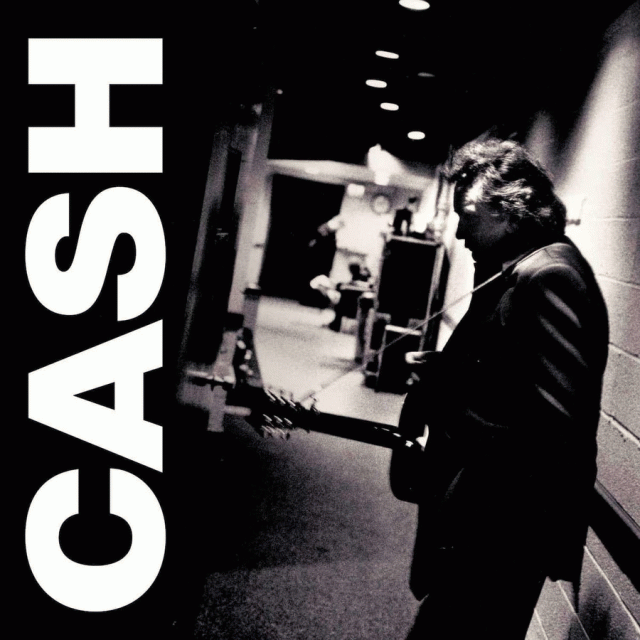Two decades ago, new albums from Johnny Cash, OutKast, At The Drive-In and others were spinning away in my portable CD player. Here’s what I had to say about them back then (with some minor editing):
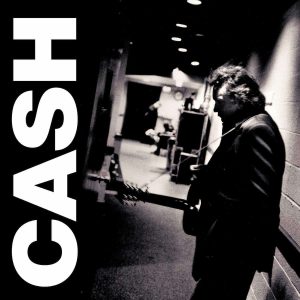 Johnny Cash
Johnny Cash
American III: Solitary Man
“I won’t back down. You can stand me up at the gates of hell, but I won’t back down.”
Could there be a more fitting motto for Johnny Cash — not to mention a more powerful opening line — that those familiar lyrics that kick off the man in black’s latest album American III: Solitary Man? Sure, they’re just Tom Petty lyrics. But sung by Cash in his rumbling, force-of-nature baritone, set to the sparse strum of an acoustic guitar, they become something much, much greater: Two simple lines that neatly, eloquently sum up a lifetime of determination, defiance, rebellion and independence come hell or high water.
Over the years, the 68-year-old elder statesman of country music has faced both ends of that spectrum, and pretty much everything between. Drug addiction, a roller-coaster career, divorce, jail, debilitating illness — Cash has endured them all with quiet grace and infinite patience, only to come out the other side wiser, stronger and even more determined to walk his own line.
Not surprisingly, that’s the path he sticks to on the powerful and moving American III: Solitary Man. For the newbies, the first part of that title comes from the fact that this is Cash’s third album with famed heavy metal and hip-hop producer Rick Rubin, who has nurtured Cash’s career for most of the ’90s, introducing new generations to his music by introducing him to theirs. As he did on their past collaborations, American Recordings and Unchained, Cash digs deep into contemporary songbooks, delivering spare covers of U2’s One, Neil Diamond’s Solitary Man, Nick Cave’s Mercy Seat and Will Oldham’s I See a Darkness along with Petty and Jeff Lynne’s I Won’t Back Down. And despite the first signs of weakness and age creeping into his once-unstoppable voice, Johnny still manages to completely and irreversibly stamp each and every song he touches as his own. After hearing Cash tremulously plead, “One love, we get to share it / It leaves you baby, if you don’t care for it,” it’s hard to believe that Bono ever sang the words — or ever could again.
The second half of Solitary Man, which features Cash’s own compositions, is only slightly less powerful. Backed by just acoustic guitars, the occasional fiddle and keyboard and a who’s-who roster of guest vocalists including wife June Carter Cash, Sheryl Crow, Merle Haggard, Petty and others, Cash takes stock of his life and art on winsome, transfixing songs like the heartfelt ballads Before My Time and Field of Diamonds and the winking two-stepper Country Trash. No, they aren’t the finest songs of his career. But for my money, the upbeat I’m Leaving Now, a raucous back-porch duet with Haggard, is worth every cent — if only to hear Johnny deliver the lines: “I wouldn’t give a nickel for another buck / I’m living on muscle, guts and luck.” You get the sense he wouldn’t want it any other way.
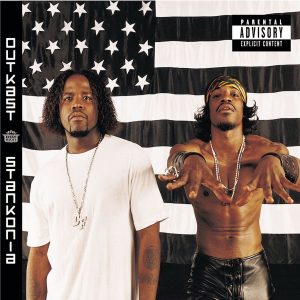 OutKast
OutKast
Stankonia
It seems most hip-hoppers these days think old-school means the first Wu-Tang album. Not OutKast’s flamboyant Big Boi and Andre 3000. For them, back in the day means back to the free-wheeling, free-thinking, gloryhallastupid days of George Clinton and Parliament-Funkadelic. From their retro-pimp duds and verbal-diarrhea titles like Southernplayalisticadillacmuzik to their acid-rock guitar solos and rubbery, flowing grooves that drop the bomb on the one, OutKast never fail to tear the roof off the sucker. Their audacious and incredible fourth album Stankonia (“seven light years below sea level … the place from which all fonky thangs come”) kicks it up another notch beyond 1998’s deservedly acclaimed Aquemini. Moving away from Southern gangsta rap and delving deeper into a dark, thick sea of funk, the pair set their cosmic-slop philosophy and political commentary against propulsive, throbbing beats and squishy, spaced-out keyboards, creating the finest collision of butt-rocking beats and mind-blowing lyrics since America Eats Its Young. Gasoline Dreams, Ms. Jackson and B.O.B. tackle inner-city violence, broken families and the Gulf War even as they set their addictive hooks deep inside your brain. In the end, your only choice is to do like old George said: Free your mind and your ass will follow.
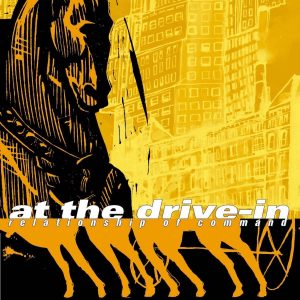 At the Drive-In
At the Drive-In
Relationship of Command
Just as every vaguely troubadourish folksinger gets tagged as “the new Dylan,” every punk band that stands a chance of selling more than a few thousand albums gets labelled “the new Nirvana.” Incendiary El Paso quintet At the Drive-In are the latest to be forced to wear that uncomfortable mantle, and while it may not quite be a perfect fit, they come closer to filling it out than anyone has before. At the very least, it’s no stretch to call Relationship of Command one of the most potent and invigorating punk discs of the year. Actually their third album and eighth release (the rest were EPs), Command packs the angular emo-core of Fugazi, the white-hot intensity of Rage Against the Machine and yes, the throat-shredding vocal style and churning, dynamic hooks of Kurt and co. into a supercharged cargo van and sends it barrelling down the desert highway with no brakes. The new Nirvana? We’ll see. But it’s damn close to punk perfection.
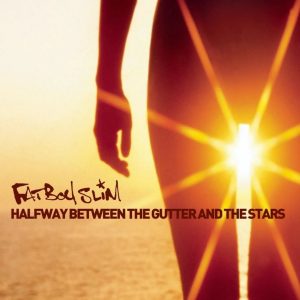 Fatboy Slim
Fatboy Slim
Halfway Between the Gutter and the Stars
Call it You’ve Come Another Long Way, Baby. After making the world safe for Big Beat with The Rockafeller Skank, Fatboy Slim unveils a few new moves on this long-awaited third album. Toning down the technicolour samples, reining in his anything-goes aesthetic and partly pinching a title from Oscar Wilde, the former Norman Cook dishes up some surprisingly supple, soulful grooves on this oft-hypnotic and reflective 11-tracker. Even wilder, he does it with the help of real live performers like Macy Gray (whose pouty rasp brings ghetto fabulousness to the groovalicious Love Life and the funky-drummer ballad Demons) and Bootsy Collins (whose Starchild esthetic mutates the quirky bounce of Weapon of Choice). Of course, they won’t garner as much attention as Slim’s other guest — lizard king hisself Jim Morrison, whose American Prayer track Bird of Prey takes wing on Fatboy’s sweeping Sunset. Only a few cuts like the edgy Ya Mama qualify as old-school dance-floor fillers; otherwise, Halfway Between the Gutter and the Stars is a new side to the funk soul brother. Check him out now.
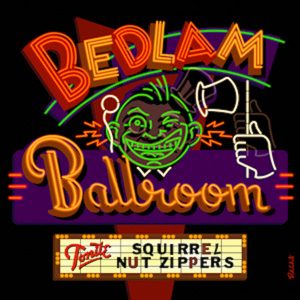 Squirrel Nut Zippers
Squirrel Nut Zippers
Bedlam Ballroom
The Bedlam part I get. It has indeed been a tumultuous few years for North Carolina hot jazz revivalists Squirrel Nut Zippers — their original trumpet player died, singer Jimbo Mathus and guitarist Katharine Whalen had a baby, and key player Tom Maxwell (who wrote their hit Hell) went solo. Some bands might thrive on such chaos; the Zippers just seem to have become confused. This sixth album seems an unfocused bid to chart a new course, with the band gamely veering from ragtime mementos (Do It This A-Way) and Hell soundalikes (Bedbugs) to bouncy Caribbean jazz (Missing Link), bumptious swing (Baby Wants a Diamond Ring) and even funky blues novelties (Do What?, Stop Drop and Roll). On the plus side, they’re still some of the finest players around, and Whalen’s Billie Holidayesque vocals get more space without Maxwell vying for the spotlight. Granted, the Zippers need to expand their retro repertoire. But not in every direction at once. For the most part, Bedlam Ballroom is the sound of Zippers trying to get unstuck.
 Spice Girls
Spice Girls
Forever
Is this title a declaration of unity and permanence? Or just an admission of how long it took Spice Girls to follow up their last album, Spice World? Either way, you have to give Baby, Sporty, Posh and Scary some props for not only hanging in there, but trying to spice up their sound in the wake of Ginger’s defection. Like much of their pre-pubescent fan base, Spice Girls have matured beyond the candy-coloured pop of Wannabe and become fans of soulful hip-hop divas like TLC and Missy Elliott. It’s that Americanized sound — full of staccato, syncopated beatboxes, slinky funk grooves, squishy synthesizers and raspy DJ backup vocals — that rocks the Girls’ world here, from the nudge-nudge pop foreplay of Holler to the full-blow bourdoir balladry of Let Love Lead the Way. It may be less fluffy than their typical fare, but Forever is still pretty disposable.
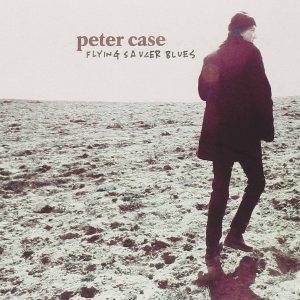
 Peter Case
Peter Case
Flying Saucer Blues
Kieran Kane
The Blue Chair
Is it just me or is the whole singer-songwriter scene reaching saturation point? Lately it seems I can’t turn around without knocking over a stack of CDs by sensitive rootsy troubadours, all spinning introspective tales on acoustic guitars with the help of endearingly ramshackle ensembles. Luckily, every so often, along come acts that stand out from the rootsy rabble. Like former Plimsoul Peter Case, whose new Flying Sauces Blues could be his finest album. It’s definitely his most rambunctious, with Case laying down infectious rockabilly boogies (Cool Drink O’ Water and Coulda Shoulda Woulda) and cabaret jazz (Lost in Your Eyes) next to breezy ballads (Paradise Etc., Walking Home Late) and his trademark narratives (Two Heroes). Just like a flying saucer oughta, this disc carries you away and makes you wonder where the time went when the ride finally ends. By comparison, Kieran Kane’s new Blue Chair isn’t quite as transporting, but it’s no slouch either. Taking a calmer and smoother tack than the excitable Case, the smoky-voiced Dead Reckoner spins 10 lazy, sparsely furnished roots ballads whose jazzy textures and Costelloesque craftsmanship are tinged with the gentle melancholy of lyrics like, “I can fix that hurt; after all, I put it there.”
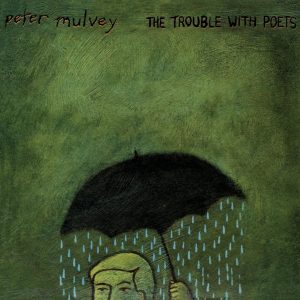 Peter Mulvey
Peter Mulvey
The Trouble With Poets
“The trouble with poets is they talk too much,” quips singer-songwriter Peter Mulvey on the strummy, lightly funky title track of his new CD. “They tell us it hurts them a little more.” He’s got a point there. Trouble is, sometimes the talented tunesmith falls victim to his own pronouncement here, filling the 11 meandering tracks of this fourth album with verse after verse in which he finds art in mundanities like a rope slapping a flagpole and stairs creaking at night. Maybe it’s the former busker in him trying to keep our interest. He doesn’t need to. What with his delicately passionate guitar work — he’s a bit Leo Kottke, a bit Ani DiFranco — his breezy roots-pop melodies, his refreshing instrumentation and this disc’s tasteful production, Mulvey’s songs have more than enough going for them.
 Samiam
Samiam
Astray
Proof that not all pop-punk bands are created equal — and that the most deserving acts always seem to get the scuzzy end of the stick. These San Francisco boys have six albums under its belt. They’ve toured relentless for years. Blink-182 used to open for them. Well, that’s changed, but thankfully, Samiam haven’t. At least not for worse. On their seventh album Astray, they’re still churning out superior servings of smartly sour, passionately scruffy post-punk, carrying the torch lit by bands like The Replacements and early Soul Asylum. Weirdly enough, they also manage to do it with a singer whose hoarse whisper and soaring yelp sound more than a bit like Bono at his best. You could do a lot worse than be led Astray.
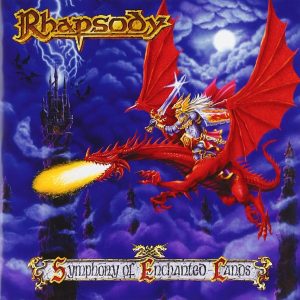 Rhapsody
Rhapsody
Symphony of Enchanted Lands
One extra-thick slice of Italian symphonic metal, with cheese. Better make that extra cheese. For their second studio disc, these self-described “mighty warriors of metal” have dropped a gargantuan concept album with a plotline worthy of a Nintendo game — something about a warrior searching for three keys to unlock the ivory gates to the land of Chaos so he can rescue an emerald sword to save his homeland from … oh hell, who cares? The real question here is, does it rock? And believe it or not, it does. Once you get past the Queen-style stacks of operatic harmonies, and after you dig beneath the grandiose prog-rock of tunes with titles like Heroes of the Lost Valley and Beyond the Gates of Infinity, you’ll find a sold foundation of galloping metal that betrays these boys’ allegiance to the spirit of classic metalheads like Iron Maiden. We wouldn’t want it for a steady diet, but there’s enough meat here to make Rhapsody’s latest a satisfying experience.
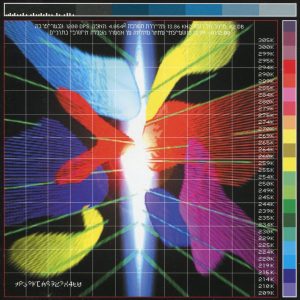 Man or Astro-Man?
Man or Astro-Man?
A Spectrum of Infinite Scale
After nearly a decade of surfing the universe powered by retro rockets, Man or Astro-Man? chart a course toward a new dimension with their 13th release. On A Spectrum of Infinite Scale, these four aliens — originals Birdstuff and Coco the Electronic Monkey Wizard, joined by newcomers Trace Reading and Blazar the Probe Handler — continue their gradual evolution from the Dick Dale-meets-Duck Dodgers cartoon surf-rockers of Project Infinity into the robo-instrumentalists of last year’s EEVIAC. Oh sure, the hang-10 licks and Wipe Out rhythms are still as plentiful as nubile aliens in Star Trek, but more often now they’re mixed with interstellar space-rock, Shellacish guitar angles and moody post-psychedelia vibes generated by reverb unit, Theremin and Tesla coil. The niftiest weapon in MOAM’s arsenal, though, is an old dot-matrix printer, recorded here a cappella as it delivers the remarkable (and remarkably rocking) solo A Simple Text File. Talk about a new universe of possibilities.
 Don Caballero
Don Caballero
American Don
The title is a jab at the trendiness of the A-word in pop culture — American Pie, Beauty, Psycho, History X, etc. But in a bizarre way, it also fits, for American Don could be the most commercially viable release of this Pittsburgh math-rock instrumental trio’s career. Of course, that theory is as relative as Einstein’s. Like their three previous albums, American Don is still firmly anchored by the band’s jaw-dropping technical chops. Prime-number time signatures, oddball keys and high-speed tempi still stop, start, invert and mutate without warning but in perfect alignment. Songs are still built from intricate webs of guitar arpeggio and bass riffage. Hyperkinetic drummer Damon Che continues to cement his position as indie-rock’s most gifted stickman. What’s different is that Don Cab seem less aggressive — these nine progressions are more firmly rooted in mood and melody instead of avant-garde chaos and hard-edged clatter. The only thing hard about American Don is how hard it must be to play this precisely and yet so beautifully.
 Nile
Nile
Black Seeds of Vengeance
I’ve always thought of the ancient Egyptians as a fairly civilized lot who spent their time wrapping mummies, building Sphinxes, praising the sun gods and so forth. Turns out they had to fit in that stuff between endless bouts of eye-gouging, hand-severing and phallus-hacking. At least, that’s if the blood-drenched lyrics of death-metal foursome Nile are anything to go by — and I presume they are, since they were all either lifted from or inspired by ancient papyrus texts, hieroglyphics, temple carvings and tomb art detailing battles and religious rites. And while lines like, “Unclean I copulate with the hands of the God and Defile the Gates of Ishtar,” are a tad intense, they’re nothing compared to this South Carolina foursome’s endless sonic onslaught of mayhem and devastation. As the band grafts Middle Eastern instruments and modalities onto pummeling, sand-shifting grind-core beats and melodies as intricate as a catacomb, guitarist Karl Sanders delivers his mummy’s-curse lyrics in subterranean tones that growl, grind and rumble like an angry pharoah being awakened from a centuries-long slumber. I’ve heard of pyramid power, but Nile truly are masters of the Temple of Boom.
 Aix Em Klemm
Aix Em Klemm
Aix Em Klemm
It is a quiet day in the primordial swamp. The rainforest hums and throbs with the pulsing of newfound life. Glowing heat waves shimmer and seem to ring as they lazily rise from the slowly ebbing and flowing lagoon. Insects buzz and chirp, whir and flutter. Above, giant flying behemoths quietly swoop and soar, coasting on warm currents that brush the treetops with a soft caress. Slowly, in the distance, come the unmistakable crackling bleeps of interstellar transport. Majestically, with the infinite grace of aligning stars, the ship Aix Em Klemm descends and comes to rest. From its distended, smoothly polished surface emerge its two occupants — Labradford’s Bobby Donne and Stars of the Lid’s Adam Wiltzie, nearly floating in the low-gravity environment. As the three suns set consecutively and the shadows envelope, the pair survey the world that they not only have chosen to inhabit, but also built from scratch. And it is good.














